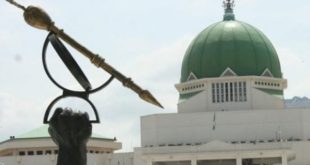BY ENYERIBE AYANWU

Until March 2023, the headquarters of the Nigerian Maritime Administration and Safety Agency (NIMASA) was No. 4 Burma Road Apapa, Lagos. That is where the headquarters of the apex national maritime regulatory agency has been since its establishment in 1987 as the National Maritime Authority (NMA).

The government agency has operated from this traditional headquarters for several decades without any whimper of complaint by management and staff. There’s been no complaint of space constraint or any other inadequacy. The head office was well-positioned and proved most suitable for the agencies operations, as it was situated within the vicinity of the nation’s major ports of Apapa and Tin can Island. Apapa is also the hub of maritime business in Nigeria where the vast majority of maritime stakeholders are located.
Not long ago, spanning over three years, the headquarters was renovated and given a modern and befitting look. Both inside and outside, the spacious 9-storey building became so changed that it can easily stand as the most modern and most beautiful edifice in Apapa. All these renovations gulped over N5billion. This does not include the cost of ICT infrastructure and state-of-the-art operational and security equipment that were installed as part of the modernization of the headquarters, nor the several hundreds of millions that were said to have been squandered on consultancy services.

Curiously, shortly after the completion of the renovation and modernisation of the headquarters, NIMASA announced that it has acquired the iconic Kanti Towers in Victoria Island Lagos as its new headquarters. A whopping sum of N17.47billion was squandered in the acquisition.
The immediate past Director-General, Dr Bashir Jamoh, who acquired the property, worked tirelessly to relocate to the new head office, spending billions of Naira in the process. By the end of last March, the relocation was completed, and the Kanti Towers is now known as Maritime Towers.
With the relocation, maritime observers are still asking the questions they asked when the news of the acquisition of Kanti Towers as new NIMASA headquarters filtered in. These questions are: What really created the need for the relocation? When did the need arise? If the NIMASA management knew that it needed to relocate the agency’s headquarters, why did it spend billions of Naira to renovate the old headquarters? What is really the motivation behind the relocation? And most importantly, what happens to the newly- renovated old headquarters, the popular Maritime House in Apapa?
These questions have become relevant in view of the criticisms that have trailed the relocation, as well as the calls on the new NIMASA DG to review the relocation. Those who are asking the new DG to review the relocation of the headquarters, which includes some top management staff of the agency, contend that the relocation makes no sense as over 70% of the maritime stakeholders are in Apapa, while the rest are outside Lagos. This means that the staff would now be commuting from Victoria Island to Apapa to do their work.
According to the NIMASA staff, the new head office is half the size of their former office in Maritime House, Apapa. Worse still, the new head office does not have a waterfront that would have enabled the staff to shuttle between Victoria Island and Apapa by boat.
Observably, the management of NIMASA did not take cognizance of the inconvenience, frustration and additional expenses or the logistical challenges the staff would face while deciding to relocate to Victoria Island. A survey of the residences of NIMASA staff would show that majority of them live in and around Apapa and its immediate environs. One also observes with amazement that NIMASA did not relocate from Apapa at the peak of the notorious Apapa traffic gridlock, only to do that when the gridlock has almost disappeared.
Apart from operational and space constraints that have been created, there are also allegations of fraud in the acquisition of the new headquarters. These allegations, to us, should be investigated in the spirit of the anti-corruption stance of the present administration.
Above all else, the new NIMASA management should hearken to the calls for review of the relocation. It will not take away anything from NIMASA if it maintains its traditional and internationally-known headquarters in Apapa while owns and rents out the numerous offices in Kanti Towers as a source of steady revenue. One of the floors with the helipad, which appears to be the major attraction of the edifice, could be rented to an aviation company that will make better use of it.
News Dissect believes that the acquisition of the Kanti Towers is a misplacement of priority and a demonstration of love for luxury and prestige. It is not meant to enhance the operational or administrative capacity of NIMASA, an agency that has much to do with ships, seaports and the sea. Relocating the headquarters of a maritime agency from a maritime environment that is well-suited for its operations and close to a waterfront, to a place that is far removed from the people they serve does not savour of good judgement and hardly gives cause for cheers.
At the former headquarters, the staff could leave their offices to enter the ports and board ships, do their job and return to the office, thereby, making for efficiency and timely services. After all, closeness of a government department or agency to its clients or customers is one of the considerations for the relocation of some agencies from Abuja back to Lagos.
We call on government officials to be more accountable, responsible and less reckless in the spending of public funds. Government agencies like NIMASA that were created for specific purposes should strive to leave up to expectation. The major reason for the creation of NMA that metamorphosed to NIMASA was to build indigenous capacity in shipping, to ensure Nigeria’s participation in international shipping.
Up until today, more than 37 years after, this has remained a dream. Nigerians cannot participate actively in cabotage trade let alone international shipping –all because of lack of funds to acquire modern vessels. Serious and development-minded nations would have bought ships instead of acquiring an office complex meant for the private sector for government use. Imagine how many indigenous shipping operators N17.47trillion would have empowered, and the effect that would have had on employment of seafarers and the economy.
 MMS PLUS NG – Maritime, Aviation, Business, Oil and Gas News Online Newspaper with coverage in Maritime, Oil and Gas, Aviation, Power and Energy as well as Financial News
MMS PLUS NG – Maritime, Aviation, Business, Oil and Gas News Online Newspaper with coverage in Maritime, Oil and Gas, Aviation, Power and Energy as well as Financial News









